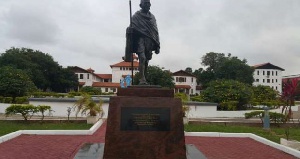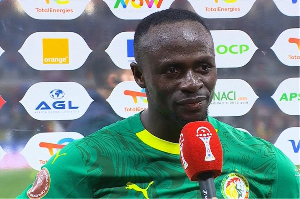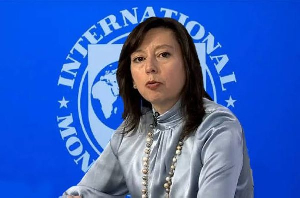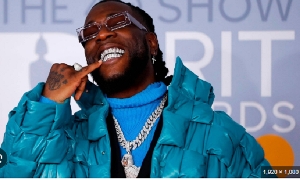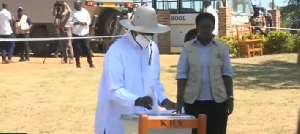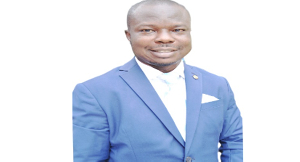By Kwarteng Francis
“Mahatma Gandhi will always be remembered as long as free men and those who love freedom and justice live” (Haile Selassie 1, Emperor of Ethiopia).
“Gandhi must be forgiven these prejudices in the context of the time and the circumstances” (Gandhi’s grandson and biographer Rajmohan Gandhi attributes this quote to Nelson Mandela).
Here are some notable comments by some Ghanaians concerned with the Gandhi Statue (BBC):
Petition objective (Courtesy of Professors at the University of Ghana).
“How will the historian teach and explain that Gandhi was uncharitable in his attitude towards the Black race and see that we're glorifying him by erecting a statue on our campus? …Better to stand up for our dignity than to kowtow to the wishes of a burgeoning Eurasian super-power.
Some harm has already been done by erecting the statue. We have failed the generation that look up to us, namely our students...Why should we uplift other people's 'heroes' at an African university when we haven’t lifted up our own?”
Prof. Kofi Asare Opoku (Chairman of the Kwabena Neketia Center for African Studies)
“However great Gandhi is; he may be great for the Indians, but for us we have our own heroes, men and women in African history that we don’t know about them. So we need our own heroes because they are the ones who can inspire us…if you take foreign heroes you would always think that greatness is reserved for foreigners; but we have our own great people here whom we must revere and honour to become a source of inspiration for our young people.”
Dr. Obadele Kambon (A research fellow at the Institute of African Studies, University of Ghana; a member of the five petition creators)
“Ideally, in its place or elsewhere, statues of classical, traditional and modern African heroes could be erected to enhance levels of self-knowledge, self-respect and self-love.”
Daniel Osei Tuffuor (A former student of the University of Ghana)
“Ghanaians should be confident in themselves and seek to project our own heroes and heroines. There is nothing peaceful about the activities of Gandhi. Anyone who claims to uphold peace and tranquillity but promotes racism is a hypocrite."
Rajmohan Gandhi (Gandhi's granson and biographer)
“He was undoubtedly ‘at times ignorant and prejudiced about South Africa's black…Gandhi too was an imperfect human being... the imperfect Gandhi was more radical and progressive than most contemporary compatriots.’”
Colin Kaepernick (US Black Lives Matter)
“In the long term, however, we would like to be part of the global movement towards self-respect and pride that we see in the removal of the Rhodes statue in Umzantsi (South Africa)...At the end of the day, we need images of ourselves for our own psychosocial well-being and not images of those who called us savages... May Gandhi fall that Africa may rise!”
Boafo Bansah (Student, University of Ghana)
“Gandhi, himself took part in the wars which led to white minority rule of South Africa. Gandhi showed no repentance for his racial views during his life time nor did he recant any of them after age should have taught him of the inherently ignorant position he had taken by placing one race above another...
“It is both counter-intuitive and fervidly weird for the University of Ghana, at the time when everyone is throwing their garbage out, to be bringing some in. There are countless statutes of Ghanaians who did this nation and Africa proud, countless statutes of Whites who stood against the status quo of the time to fight for African liberation and equality.”
Some general remarks
Gandhi’s racism was not a product of the times.
Racism is racism regardless. In other words it still exists even though Gandhi is not here with us today. Also time does not heal certain wounds such as those from racism (and ethnocentrism).
For instance, pain from the Rwandan Genocide (Tutsis versus Hutus) is still there in Rwanda in both overt and covert expressions.
Thus, time merely conceals certain acts of racism under the guise of canonization or sainthood as in the case of Gandhi, Junípero Serra, or Jesuit Missionary Pierre-Jean De Smet.
Though time may be external to the progressive atrophying of the existential potential of human beings, its power of mediation and intrusiveness in human affairs—thoughts and actions—is only matched by the eidetic memory of the universal mind.
Man is but transient, temporary, a shadow of dead light in the existential ambience of time-continuum, yet his deeds are infinitely, endlessly memorialized in the universal mind of the living.
Certainly man dies, passes on, if you will, though the illusion of time grants him and his deeds a continuity of existence in the universal mind of the living.
This may be why Gandhi’s racism is alive today as it was yesterday. That is, Gandhi is more alive today than he was yesteryear, namely dying or passing on yesterday.
Therefore, the anonymous auctorial authority of Shakespeare got it only partly right when he had Antony say in “Julius Caesar” (Act 3, Scene 2, Page 4):
“The evil that men do lives after them; the good is oft interred with their bones.”
Again, this is far from a universal truth. Actually, the evil and the good men do are both interred with their “bones.” These “bones” are indelibly engraved on the universal mind of the living.
Memory drives and sustains the universal mind of the living. Memory is such a powerful instrument of human consciousness.
It is therefore sad, even unfortunate, that while Prof. Ampofo moralizes a good cause in solid defense of Africans’ dignity and humanity, Prof. Oquaye politicizes it in his heartless soul because he essentially sees black South Africans as a different species of homo sapience from the African stock.
No wonder one of his major idols, political philanderer K.A. Busia was in bed with Apartheid, a stunning revelation that would cost Cameron Duodu his job as the editor of the Daily Graphic. Read (Zakariah Ali):
“The members of the government pretended to care about press freedom but made it impossible for any paper with contrary opinion to be published.
“Dr. Busia and his government kept in place all the powers and restrictions that the Nkrumah government instituted against free press and free speech. As an example of their hypocrisy, the editor of the Daily Graphic wrote an editorial piece that heaped praises on the Prime Minister. He was so pleased with the praise that he went to his office on a Sunday and sent a congratulatory telegram to the editor of the paper, Cameron Duodo.
“And a few short weeks later when the same editor wrote an unflattering editorial comment about the government, he was fired.”
Clearly Prof. Oquaye is among those Eurocentric, intellectually and culturally de-centered Africans Gandhi called “Kaffir.” These “Kaffirs” opposed Nkrumah and everything he stood for, including the question of self-determination for the Gold Coast and the African Personality, and the de-colonization of Africa.
In fact, he harbors so much hatred for Nkrumah that this hatred now borders on a psychotic obsession with the world’s “Africa’s Man of the Millennium.”
Here, listen to him again with his usual unsophisticated yet dangerous, uninformed canards about Africa’s greatest personality, a purely partisan political concoction of half-truths and blatant lies:
“Nkrumah was an honest man, even when he was wrong. Nkrumah was not a thief, and I am saying it authoritatively upon research…Nkrumah was wrong in giving out monies to countries like Guinea in pursuing a wrong policy of socialism…I admire his vision for education, his [establishment of the] Tema Harbour and many other things.”
What has Prof. Oquaye, an intellectual conman, said about Nkrumah that has ever been based on authoritative research? Absolutely none! It will surely be a complete waste of our time trying to refute these half-truths and blatant lies being passed off as genuine outcomes of authoritative research efforts.
Of course we concede that he is an intellectual fraud at best, and will simply leave it at that! It is best to ignore his brand of sicko intellectualism which is the enemy of the kind of Africa Nkrumah envisioned, a memory borne of African-centered consciousness.
But that part of the universal mind which is the memory of Africa is in bondage, which is that that memory is forced into bondage by the curse of Eurocentrism. Africa cannot think, neither can it put its memory to good use. African leaders like Prof. Oquaye are part of the problem if not the problem itself.
“One, one cocoa full a basket,” Bob Marley sang on “Wake Up and Live.”
Unfortunately, if not ironically, Prof. Oquaye has been sleeping, ever sleeping, neither awake nor living. His memory is a “basket case” that can only accommodate the “cocoa” of Eurocentrism and partisan politics and not the “water” of Afrocentric consciousness.
“Every day the bucket a-go a well, one day the bottom a-go drop out,” cried Bob Marley on “I Shot the Sherriff.”
A tipping point is nearing.
A breaking point is nearing.
A boiling point is here.
Bob Marley may have been talking about the ideas of social-political uprising, critical mass, revolutionary change in the status quo. Yes, this was a man who practiced/rehearsed his lines at a Kingston cemetery in the wee hours of the morning just so he could overcome the specter of stage fright. Such a man, Bob Marley.
The bucket that goes to the well every day will certainly never get full. Rather, its bottom will drop out. In other words, public anger against such wicked and lying politicians as Prof. Oquaye has a threshold beyond which a critical mass will descend on them and show them what coldness is all about.
Let Prof. Oquaye support the removal of the Gandhi statue before the bottom of the bucket of public anger drops out upon his wicked head, his wicked soul.
Conclusion
Indeed, Professor Prof. Akosua Adomako Ampofo is wiser! In reality, Prof. Ampofo is the wiser and more prudent one because she and her like-minded colleagues will not allow the racism of Gandhi and the ignorance of Prof. Oquaye to oppose the maturation of the African Personality.
It is quite interesting to hear Indian President Pranab Mukherjee, at the unveiling of the Gandhi statue on June 16, 2016, strongly advise the Ghanaian youth “to emulate and concretize the ideals of Ghana’s first president, Dr. Kwame Nkrumah and India’s Mahatma Gandhi, adding that doing so meant a right direction towards development,” according to the website of the University of Ghana.
Prof. Let us then say that Oquaye sees ultimate goodness in the Gandhi statue per the Mukherjee speech but quickly ignores the Nkrumah part.
Rather strangely, though, Prof. Oquaye and his ideological idols, including his father, opposed and undermined every progressive efforts Nkrumah initiated in the days of yore and, today, he is re-enacting that shameful past in the theatre of ideological and diplomatic buffoonery where his kind take solace in their inferiority complexes.
Perhaps Prof. Oquaye has to take a look at Edward Said’s “Orientalism” which takes on Western colonial racism towards Asia and offers serious, dialectic critiques of writers from Rudyard Kipling’s “Kim” to his “The Jungle Book,” to mention but two literary works by a colonial-imperialist British author, with collateral support from prominent Indian academics such as the computer scientist, mathematician, educator, physicist and historian Chandra Kant Raju, whose works expose and critique the historical racism of the West towards India among others.
Prof. Oquaye should closely read B.R. Ambedkar’s speech “The Annihilation of Caste (1936)” and also Arundhati Roy’s commentaries on Gandhi and the Dalits. We have no doubt in our minds that Prof. Oquaye will oppose the progressive projects Drs. Ama Mazama, Molefi Kete Asante, Kofi Kissi Dompere, Theophile Obenga, Chinua Achebe, Abdias do Nascimento, Toni Morrison, Ngugi wa Thiong’o, Cheikh Anta Diop…had undertaken to get the African world back to its rightful place in human civilization and history.
On the other hand while we are not taking away his right to independent thought or the pursuit of alternative policy positions in this serious matter regarding the Gandhi statue, we are more than appalled by the emotional childishness and moral stupidity of his diplomatic excuse against the petition, by his immature hatred of Nkrumah, racial equality and the Afrocentric project, and by his love for Eurocentric racism and imperialism and black inferiority complex.
If he will not fight against or resist racism, then he will also not fight against or resist ethnocentrism. If Prof. Oquaye endorses the Gandhi statue, then he will also endorse those whose ethnocentric actions gave birth to the Rwandan Genocide.
Where does that leave ethnocentrism in Africa then, Prof. Oquaye?
REMINDER End of four-part series!
References
Mohan Megha. “BBC Trending: Ghana’s Problem With ‘Racist’ Gandhi.” September 21, 2016. Retrieved from http://www.bbc.com/news/blogs-trending-37430324
Ghanaweb. “Nkrumah Wasn’t A Thief—Mike Oquaye.” September 22, 2016.
Adam Taylor. “In Ghana, Calls to Tear Down A Statue of ‘Racist’ Gandhi.” September 20, 2016. The Washington Post. Retrieved from https://www.washingtonpost.com/news/worldviews/wp/2016/09/20/in-ghana-calls-to-tear-down-a-statue-of-racist-gandhi/
Boafo Bansah. “Gandhi in Legon? P-LEEEEEEEEEEESE!”June 16, 2016. Retrieved from http://www.legonconnect.com/gandhi-in-legon-p-leeeeeeeeeeease/
Zakariah Ali. (2012). “Walk With The Devil: My Endless Struggle Against The Cunning And Traps Of The Devil.” Book publisher XLBRIS.
Ghanaweb. “UG Must Honor African Heroes, Not Gandhi—Prof. Opoku.” September 23, 2016.
Opinions of Monday, 26 September 2016
Columnist: Kwarteng, Francis

